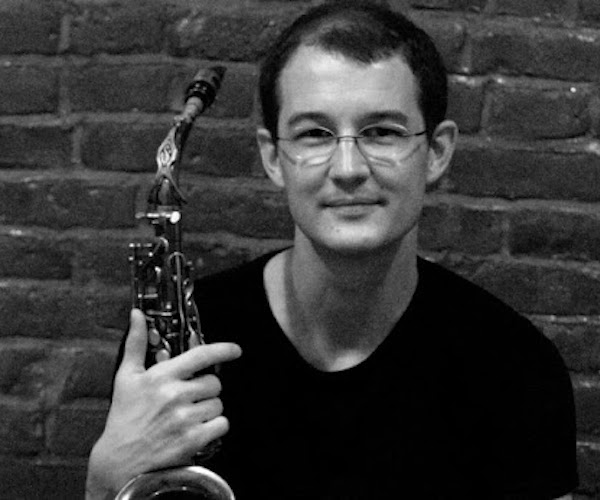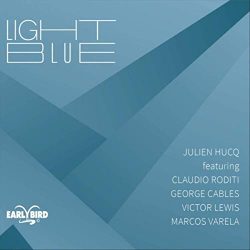Jazz CD Review: “Light Blue” — Tight and Graceful
By Michael Ullman
Overall, Light Blue is an impressive album: its ensembles simultaneously tight and graceful, its solos expressive.
Julien Hucq, Light Blue. (Early Bird Records)

Saxophonist Julien Hucq.
There’s an unintentionally melancholy aspect to Belgian-born saxophonist Julien Hucq’s new disc, Light Blue. It has a stellar rhythm section, with veterans George Cables on piano, Vic Lewis on drums and, new to me, Marcos Varela on bass. Named after the Thelonious Monk composition “Light Blue,” first recorded by its composer at the Five Spot in 1958, the session also features trumpeter Claudio Roditi, Brazilian-born but once a resident of Boston. Roditi died on January 17, just as this session was being released. (Arts Fuse remembrance) His playing on Light Blue gives us another reason to miss Claudio, one of the most endearing — as well as talented — jazz musicians.
The set begins with a blues by bassist Mickey Bass, “Mudd’s Mode,” which Hucq tells me is dedicated to pianist John Hicks. “Mudd” was Bass’s nickname for Hicks. Its main melody is a deliberately meandering line that leads to four more obviously bluesy bars in 4/4. Hucq takes the first solo, entering obliquely and playing around the obvious notes in a way that reminded this listener of the strategies (but not the sound) of Eric Dolphy. He performs a pleasing set of choruses, his note choices unexpected and coherent. Roditi jumps in just as Hucq plays his last note as if he couldn’t wait to have his say on the blues. Cables follows: an additional reason to hear the disc is to take in the crisp, long lines and bright ideas of this pianist, whom I first heard with Dexter Gordon. The band plays stop time over Lewis’s drum solo. The group is obviously well rehearsed and also creative.

The perfectly named Hucq composition “Light” follows. It’s a delicately dancing tune: listening to it is like watching a shimmering balloon float about on a sunny day. It should be the theme song of a cheery French movie. Remarkably, the soloists, beginning with a muted Roditi, who initially merely repeats the melody, maintain the light mood while (of course) complicating the lines. This is one of the trumpeter’s finest, though unpretentious, solos, partially because of the way he varies the rhythm, hanging on to a note here, bending it mildly, or spitting out a fast sequence elsewhere. And Cables is just as masterly.
Hucq kicks off the ballad feature “Here’s That Rainy Day” threateningly. Splashes of cymbals, bowed bass, and alto seem to poke through the clouds. He plays the familiar-sounding melody almost starkly, without vibrato and (mostly) resolutely on the beat. Roditi takes over the second A section on flugelhorn (I believe) and is just as sober. The band renders (delightfully) the confident swagger of Monk’s “Light Blue.” Overall, this is an impressive album, its ensembles simultaneously tight and graceful, its solos expressive. The group sounds like a band of brothers, and the musicians wind up the session by celebrating their unity with Hucq’s liveliest composition, “X.”
Michael Ullman studied classical clarinet and was educated at Harvard, the University of Chicago, and the U. of Michigan, from which he received a PhD in English. The author or co-author of two books on jazz, he has written on jazz and classical music for The Atlantic Monthly, The New Republic, High Fidelity, Stereophile, The Boston Phoenix, The Boston Globe, and other venues. His articles on Dickens, Joyce, Kipling, and others have appeared in academic journals. For over 20 years, he has written a bi-monthly jazz column for Fanfare Magazine, for which he also reviews classical music. At Tufts University, he teaches mostly modernist writers in the English Department and jazz and blues history in the Music Department. He plays piano badly.
Tagged: Claudio Roditi, Early Bird Records, George Cables, Julien Hucq
